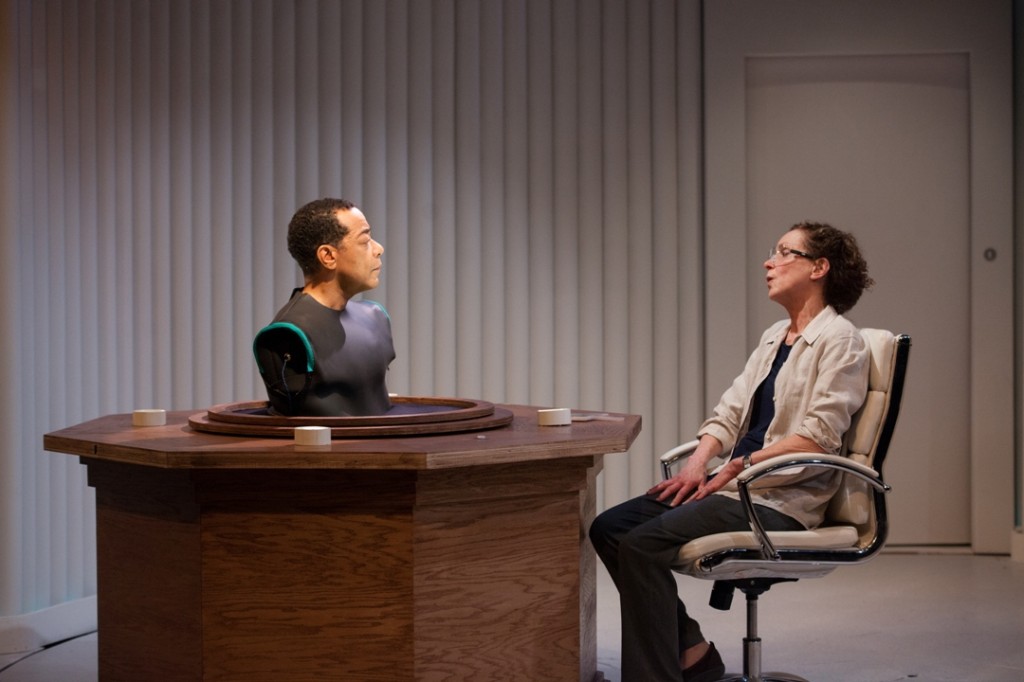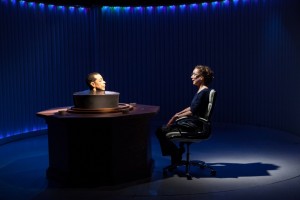
Post-modern technology collides with human ethics in InterAct Theatre Company’s revolving world-premiere production of playwright-in-residence Thomas Gibbons’ UNCANNY VALLEY. Directed by Seth Rozin and starring Frank X, the team that brought the debut of Gibbons’ PERMANENT COLLECTION to Philadelphia audiences considers another provocative subject for our computer age: the advances in, and potential dangers of, artificial intelligence.
The story is set in the year 2050, when Julian (X), an artificial being, has been created in a life-extension laboratory to receive the consciousness of a dying man who covets immortality. His cost: $240,000,000. It falls on Claire (Sally Mercer)—a septuagenarian scientist whose career was devoted to pioneering developments in the field—to train the robot to appear more convincingly human in its (or is it his?) movements and behaviors. Julian makes fast progress, but simultaneously raises significant moral issues that cause Claire, who is dealing with her own familial problems outside of the lab, to question the essence of her creation.
Frank X brings Julian to life, masterfully transitioning from a head to a full body, discovering the world around him and the new sensations and awareness that come with each new stage in his evolution (like we all do, as we grow from infancy into adulthood). He is at first staccato and awkward in his motion and speech, but becomes increasingly fluid and fluent, and utterly joyous with his discovery of dance (in which the multi-talented actor was originally trained). Sally Mercer as Claire is a study in professional decorum and psychological avoidance, until Julian forces her to confront the troubles that plague her family and can’t be confined to the controlled environment of a laboratory. Like that of her co-star, her emotional development is nuanced and compelling.

Is a human being defined by a mortal body or by consciousness? Is there a difference between consciousness and intelligence? Does consciousness lack conscience, and a soul? Can real human emotions be learned, or only simulated? Were people meant to live forever (“liberating our consciousness from its expiration date”), or should there be a natural succession of generations? Is it fair for the rich to buy privileges denied to those who can’t afford them, or will their money fund further advances in science that will ultimately benefit everyone? Is this science-fiction, or the non-fiction of the not-too-distant future? These are serious socio-philosophical questions that resonate well beyond the context of the play and the computer-based technology of robotics.
A stark white futuristic set (Nick Embree) and cold lighting (Peter Whinnery) evoke the sterility of a science lab, while a warm wooden cabinet and a few small wall shelves displaying Claire’s personal photographs, art, and collectibles remind us of the importance, natural beauty, and true intelligence of humanity. In conjunction with the production, you can face the future when Bina48, one of the most uncanny of actual mind-clone robots, will be in the house for a quick post-show talkback on April 17, and a pre-show conversation beginning at 5 pm on April 18. [Main Stage at The Adrienne, 2030 Sansom St.] April 3-26, 2015; interacttheatre.org.

One Reply to “UNCANNY VALLEY (InterAct): What makes us human?”